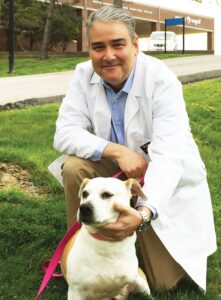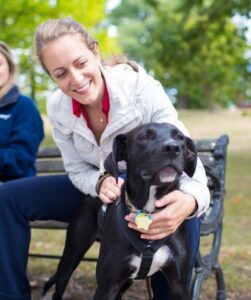-
Adopt
-
Veterinary Care
Services
Client Information
- What to Expect – Angell Boston
- Client Rights and Responsibilities
- Payments / Financial Assistance
- Pharmacy
- Client Policies
- Our Doctors
- Grief Support / Counseling
- Directions and Parking
- Helpful “How-to” Pet Care
Online Payments
Emergency: Boston
Emergency: Waltham
Poison Control Hotline
-
Programs & Resources
- Careers
-
Donate Now
 By Joel Kaye, DVM
By Joel Kaye, DVM
angell.org/generalmedicine
generalmedicine@angell.org
617-522-7282
Recommendations as of October 9, 2019
Just as in people, pets can become infected with multiple strains of flu. There are two known strains of canine influenza at this point the H3N8 and H3N2. Like in people, vaccination for one does not protect against the other. So far the disease has been found in multiple states that typically occurs as outbreaks that quickly spread and then die down.
Clinical Signs
There are two major forms of the disease, mild and severe.
In the mild form typically there is a 10 to 20 day course of a cough, sometimes accompanied by nasal discharge and mild lethargy. Pets typically are eating and drinking fine, they just are a little off. This can present clinically very similar to what we call kennel cough caused by bacteria called Bordetella Bronchiseptica.
The more severe form will present with fever (103 – 106), lethargy, and mucopurulent nasal discharge. Pets will often not eat and be quite ill. A lot of the symptoms that we see come from secondary infections such as bacterial pneumonia. There have been fatal cases reported, however most dogs will recover with supportive care and time. However the disease can be severe and protracted.
Transmission
A dog is most likely to be contagious before showing any signs at all.
Influenza viruses are not hardy: they do not persist in the environment for very long. However, they do spread easily between individuals. Transmission generally requires direct contact with an infected and contagious dog’s fresh saliva or oro-nasal secretions. The problem is that an infected dog is usually contagious before showing any clinical signs. Therefore, apparently healthy dogs can transmit the disease.
When should I seek veterinary care?
A dog exhibiting symptoms and living in an area where outbreaks are being reported should be considered to have canine flu until proven otherwise. If your dog is from such an area, or there has been mention of canine flu on your local news, and he has a cough (and especially if he’s feeling sick), see your veterinarian. Don’t ignore it. Canine influenza virus is very contagious, andyou may be asked to isolate your pet from others upon arrival in the hospital.
The tests and treatments your veterinarian might recommend depend on the severity of the illness. For mild disease, the veterinarian might take samples to identify the cause, but only treat the signs. The reason for the samples, is to find out whether this is truly canine influenza virus versus the many other possible factors involved in canine infectious respiratory disease complex. In more severe cases, chest X-rays (radiographs) are often taken to look for possible pneumonia. Dogs with severe disease can require hospitalization with oxygen and fluid therapy.
The very young and seniors (who may have compromised respiratory systems or concurrent diseases associated with age) may be more likely to have severe signs of illness.
Whether or not to vaccinate is a controversial discussion at this point in veterinary medicine. There is a vaccine that covers for the two most recognized strains. Please keep in mind that the vaccination does not prevent disease, it only decreases severity and decreases shedding. However it does not eliminate shedding completely. If your dog spends a lot of time in dog parks, or day care facilities, you might want to vaccinate them. For now our doctors at Angell are not recommending routine vaccination. However if we see an outbreak in the area this might change.
Prevention
The best preventative measures are to limit or prevent exposure as lifestyle plays a factor in the risk of getting either strain of flu. Dogs that go to day care, dog parks, performance competitions, dog shows, training classes, or boarding kennels have a higher risk. Dogs that spend most of their time at home or rarely come into contact with other dogs have a lower risk.
Don’t let your dog socialize with coughing dogs.
